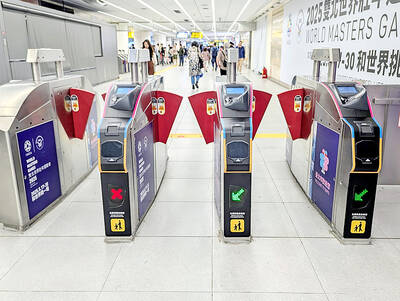China’s application of “one country, two systems” in Hong Kong proves that it is inappropriate for Taiwan, Brookings Institution Taiwan Studies director and former American Institute in Taiwan chairman Richard Bush said.
The whole idea has become a “major obstacle” to China achieving its political objectives with respect to Taiwan, Bush told a Washington hearing into the future of democracy in Hong Kong held by the Congressional-Executive Commission on China.
The commision’s chairman, Senator Sherrod Brown, a Democrat, said that Bush had mentioned fears in the highest echelons of the Chinese government that Hong Kong might look too much like Taiwan in terms of democracy.
He asked Bush how the Hong Kong protests had impacted Taiwan.
“It is my impression that after the initial media coverage of the Hong Kong situation, public attention in Taiwan was diverted to other issues,” Bush said.
“What has happened in Hong Kong, and what is likely to happen in Hong Kong, only confirms a long-held belief that the two entities should not be treated under the same framework as China is trying to do,” he added.
Brown said news reports suggested that President Ma Ying-jeou (馬英九) had developed a closer friendship with China compared with former president Chen Shui-bian (陳水扁).
If Taiwan was moving toward “some kind of Chinese model,” Brown said, he wondered how the Hong Kong protests might affect the situation.
Bush said that what was happening in Hong Kong contributed to a trend that was already in play.
“The Ma administration and China have grabbed all the low-hanging fruit in terms of the sorts of cooperation they can get,” Bush said.
He said that Taiwanese politics had been immobilized earlier this year by the Sunflower movement.
“Where China would really like to go on cross-strait relations is political talks and President Ma has correctly been very wary of going down that road because he is very committed to the idea of the Republic of China,” Bush said. “And that is something that Beijing doesn’t want to talk about.”
Bush said that Ma, who was born in Hong Kong, came out a few weeks ago with a very strong statement in favor of democracy in Hong Kong and the peaceful protests going on there.
“Beijing was profoundly unhappy with his statement and felt that he was sticking his nose where it didn’t belong,” Bush said.
Asked by Brown if the Sunflower movement in Taiwan had served as a template for what was happening in Hong Kong, Bush said there had been a lot of interaction between activists “exchanging experiences and techniques.”
He said that the interaction could play into the China “narrative” that the Hong Kong protests were fueled by “a bunch of black hands from the US, Taiwan and so forth.”
However, the Hong Kong protests were “definitely homegrown,” he said.

A magnitude 6.4 earthquake struck off the coast of Hualien County in eastern Taiwan at 7pm yesterday, the Central Weather Administration (CWA) said. The epicenter of the temblor was at sea, about 69.9km south of Hualien County Hall, at a depth of 30.9km, it said. There were no immediate reports of damage resulting from the quake. The earthquake’s intensity, which gauges the actual effect of a temblor, was highest in Taitung County’s Changbin Township (長濱), where it measured 5 on Taiwan’s seven-tier intensity scale. The quake also measured an intensity of 4 in Hualien, Nantou, Chiayi, Yunlin, Changhua and Miaoli counties, as well as

Credit departments of farmers’ and fishers’ associations blocked a total of more than NT$180 million (US$6.01 million) from being lost to scams last year, National Police Agency (NPA) data showed. The Agricultural Finance Agency (AFA) said last week that staff of farmers’ and fishers’ associations’ credit departments are required to implement fraud prevention measures when they serve clients at the counter. They would ask clients about personal financial management activities whenever they suspect there might be a fraud situation, and would immediately report the incident to local authorities, which would send police officers to the site to help, it said. NPA data showed

ENERGY RESILIENCE: Although Alaska is open for investments, Taiwan is sourcing its gas from the Middle East, and the sea routes carry risks, Ho Cheng-hui said US government officials’ high-profile reception of a Taiwanese representative at the Alaska Sustainable Energy Conference indicated the emergence of an Indo-Pacific energy resilience alliance, an academic said. Presidential Office Secretary-General Pan Men-an (潘孟安) attended the conference in Alaska on Thursday last week at the invitation of the US government. Pan visited oil and gas facilities with senior US officials, including US Secretary of the Interior Doug Burgum, US Secretary of Energy Chris Wright, Alaska Governor Mike Dunleavy and US Senator Daniel Sullivan. Pan attending the conference on behalf of President William Lai (賴清德) shows a significant elevation in diplomatic representation,

The Taipei MRT is to begin accepting mobile payment services in the fall, Taipei Rapid Transit Corp said on Saturday. When the company finishes the installation of new payment units at ticketing gates in October, MRT passengers can use credit cards, Apple Pay, Google Pay and Samsung Pay, the operator said. In addition, the MRT would also provide QR payment codes — which would be compatible with Line Pay, Jkopay, iPass Money, PXPay Plus, EasyWallet, iCash Pay, Taiwan Pay and Taishin Pay — to access the railway system. Currently, passengers can access the Taipei MRT by buying a single-journey token or using EasyCard,